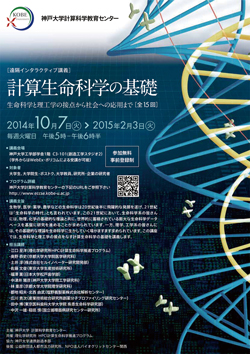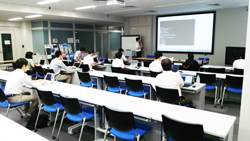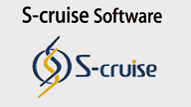
Life sciences, such as biology, medicine, pharmacy and agricultural science, developed dramatically in the latter half of the 20th century. In the 21st century, which is called “the era of life sciences,” scientists are required not only to investigate the fundamental theories of physics and chemistry but also to carry out research based on enormous databases related to life sciences, which have accumulated all over the world. It is also increasingly required to apply the fundamental theories of physics, chemistry and engineering in life sciences.
SCLS is giving a series of a course of basic lectures on computational life science, which forms the tangent point of life and engineering sciences, jointly with the Education Center on Computational Science and Engineering of Kobe University for undergraduates, graduate students and working members of society.
The course, which started in October 2014, consists of 15 lectures in three categories ranging from the tangent point of life and engineering sciences to applications in society; they are “Life Sciences Viewed from the Genome,” “Life Sciences Viewed from the Protein,” and “Life Sciences in Medicine and Drug Discovery.” The lectures are easy to attend as auditing students can attend the lectures via their own personal computer.
All lectures are given by scientists active in various fields at universities, companies, and others. The lecturers overview computational life science, introduce technologies of data mining, mention gene expression databases, and briefly explain methods of calculating and analyzing molecular dynamics simulations of proteins, and the present states and prospects of computational life science in the fields of medicine and drug development.
About 260 undergraduates, graduate students and researchers of companies have registered and are attending the lectures. We believe that they will form a community of computational life science researchers, transform Kobe, which is now a supercomputer center, into a base for transmitting computational life science information, and propel the development of computational life science into the future.
The FY2014 course will end on February 3 (Tuesday), 2015; but the course is scheduled to be held also in FY 2015. We look forward to your attendance.



















